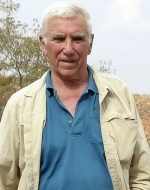
Craig Dorman was elected to the ARCUS Board of Directors in 2014. His three-year term ends in 2017.
Craig Dorman received his PhD in oceanography from the Massachusetts Institute of Technology/Woods Hole Oceanographic Institute and had a 26-year career in the U.S. Navy from which he retired in 1989 at the rank of Rear Admiral. During the last half of that career the Arctic and its physical environment were a major cold war concern because of the then-USSR's reliance on its Northern Fleet. Craig later served as Director of the Woods Hole Oceanographic Institute, Technical Director of the Office of Naval Research International Field Office, visiting professor at Imperial College, and Vice President for Research for the University of Alaska System. Craig writes, "Given the nature of my responsibilities during all my working years, rather than being a researcher myself I have been a sponsor, manager, administrator, promoter, and user of research, which has led to a very broad interest in all aspects of the circumpolar Arctic and its inhabitants, from art to geopolitics.
"Having been intimately involved with polar research for well over 40 years I have seen U.S. Arctic interest and funding wax and wane more than once. We're currently in a period of high and growing interest in the Arctic, and I see no reason why that should diminish for at least the next decade. I am very pleased that current concerns across the U.S., as expressed in our national Arctic policy and strategy, are much broader than they were in the days of the 'cold war,' and in particular that the interests of Alaska Natives and other indigenous peoples of the North are central to other priorities, be they environmental, economic, or national security.
"The role of ARCUS has similarly grown and diminished through the years. I'm pleased to be on the Board when a rejuvenated ARCUS is greatly needed by the nation to help pull together the entire civilian research community—academic and industrial, communities and individuals—to parallel and underpin federal efforts through IARPC and other mechanisms to meet the challenges we face in the Arctic. I can state my own views no better than the criteria for ARCUS membership: 'ARCUS members shall have a common purpose of advancing science, promoting the application of their knowledge to circumpolar Arctic problems, and addressing in concert those scientific and technological questions that require the collaborative skills and resources of scientists, engineers, and others throughout the world.' ARCUS as an organization is the nation's key resource for building a common purpose toward addressing today's pressing Arctic issues."
